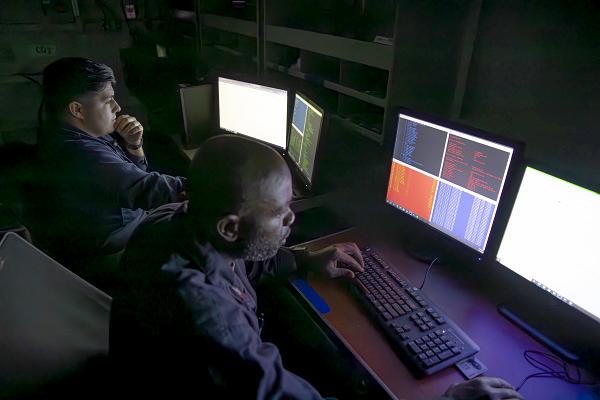
Pacific Ocean. (May 25, 2024): With the arrival of artificial intelligence, the job of protecting the Navy from cyber-attack is more critical than ever. In this photo by Seaman Joey Sitter, Cyber Warfare Technician 2nd Class Paul Mendez (left) and Cyber Warfare Technician 1st Class Romeo Mashaka conduct a training exercise aboard the Nimitz-class aircraft carrier USS Abraham Lincoln.
Formerly called Cryptologic Technicians, these warriors fight in the battlespace of the future. Cyber Warfare Techs use state-of-the-art computers to perform offensive and defensive cyber operations and to investigate and track enemies in cyberspace. They are also responsible for protecting Navy networks from attack. They are also experts in communications defense and using forensics to investigate threats against Navy computer systems.
Crypto Techs detect, react, and recover from any disruptions initiated by the enemy and continually assess network vulnerability. Should a breach occur, these highly skilled warriors use their forensic skills to investigate the incident, reconstruct what happened, and then develop countermeasures to correct the problem.
To become a Cryptologic Warfare Technician, Sailors must complete Boot Camp at Recruit Training Command in Illinois and then Class A advanced training at Pensacola, Florida. The school is twenty-three weeks of intense study of advanced computer network systems and troubleshooting methods. The job requires a high school diploma or equivalent and applicants must be U.S. citizens. Most critically, applicants must also meet eligibility requirements for a Top Secret/Sensitive Compartmented Information security clearance.
In Pensacola, Students study the fundamentals of basic communication and computer/network theory, communication techniques and platforms, and basic network configuration.
They also study troubleshooting theory and techniques, cryptographic equipment, and operational security. After graduation, Crypto Techs can expect to be assigned worldwide or at duty stations in the continental U.S. and Hawaii.
Given the explosion of artificial intelligence, the Navy depends on these cyber warriors to defeat threats to the fleet.


